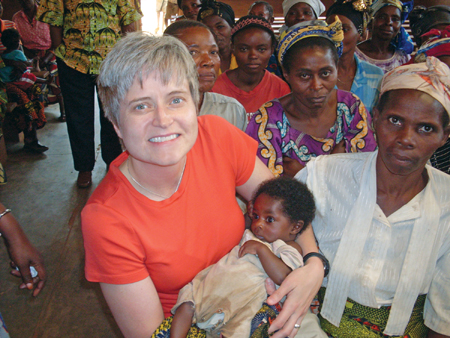March 6, 2010 | by Andrea Appleton

Nancy Glass, Nurs ’94, Nurs/SPH ’96 (MSN/MPH)
Pork Project
Nancy Glass, associate director of the Center for Global Health and associate professor in the School of Nursing’s Department of Community Public Health, believes economic empowerment is often the key to helping victims of violence reclaim their lives. Yet in the war-torn Democratic Republic of the Congo, where Glass was once a Peace Corps volunteer, there are few legitimate ways to earn a living, particularly for the many women who carry a stigma as survivors of rape.
Glass and her Congolese colleague, Mitima Remy, have come up with a simple, inexpensive way to help. Last year they launched Pigs for Peace, a volunteer-run microfinance organization that provides pigs, along with breeding assistance and veterinary support, to Congolese women. In exchange for their free pig, recipients agree to give the organization two piglets from the first few litters. (These are then given to other women, so the program grows exponentially.) Each litter consists of six to 12 piglets; they can be kept for breeding or sold, for as much as $40 each. “In an economy where people are making less than $100 a year, a pig can really make a difference,” says Glass. With the money generated from the sale of piglets, women have been able to start businesses, get access to health care, and send their children to school.
Pigs for Peace is run entirely by volunteers, so there is little overhead. Each $50 donation covers a pig ($40) and its transportation ($10). In its first year, the group provided pigs to 110 families. Another 700 families are on the waiting list, and Glass—whose efforts will be honored with a 2010 Johns Hopkins Alumni Association Knowledge for the World Award—hopes to generate enough interest in the program to help them all. “I really believe a pig can save a family,” she says.
Nancy Glass, Nurs ’94, Nurs/SPH ’96 (MSN/MPH)

Nancy Glass. Photo: Mitima Remy, Paidek
Nancy Glass, associate director of the Center for Global Health and associate professor in the School of Nursing’s Department of Community Public Health, believes economic empowerment is often the key to helping victims of violence reclaim their lives. Yet in the war-torn Democratic Republic of the Congo, where Glass was once a Peace Corps volunteer, there are few legitimate ways to earn a living, particularly for the many women who carry a stigma as survivors of rape.
Glass and her Congolese colleague, Mitima Remy, have come up with a simple, inexpensive way to help. Last year they launched Pigs for Peace, a volunteer-run microfinance organization that provides pigs, along with breeding assistance and veterinary support, to Congolese women. In exchange for their free pig, recipients agree to give the organization two piglets from the first few litters. (These are then given to other women, so the program grows exponentially.) Each litter consists of six to 12 piglets; they can be kept for breeding or sold, for as much as $40 each. “In an economy where people are making less than $100 a year, a pig can really make a difference,” says Glass. With the money generated from the sale of piglets, women have been able to start businesses, get access to health care, and send their children to school.
Pigs for Peace is run entirely by volunteers, so there is little overhead. Each $50 donation covers a pig ($40) and its transportation ($10). In its first year, the group provided pigs to 110 families. Another 700 families are on the waiting list, and Glass—whose efforts will be honored with a 2010 Johns Hopkins Alumni Association Knowledge for the World Award—hopes to generate enough interest in the program to help them all. “I really believe a pig can save a family,” she says.

